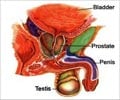Aspirin is significantly associated with lower PSA (prostate-specific antigen) levels, especially among men with prostate cancer.
Researchers at Vanderbilt University have found that the use of aspirin and other non-steroidal anti-inflammatory drugs (NSAIDs) is significantly associated with lower PSA (prostate-specific antigen) levels, especially among men with prostate cancer.
The findings are based on a study, which included 1,277 participants referred to a urologist for a biopsy of their prostate.Approximately 46 percent of the men reported taking an NSAID, mostly aspirin (37 percent of all men).
After taking into account age, race, family prostate cancer history, obesity, and other variables that have independent effects on the size of the prostate organ, cancer risk, and PSA levels, the researchers found that aspirin use was significantly associated with lower PSA levels.
They found that PSA levels were 9 percent lower in men taking aspirin compared with men who did not use aspirin.
A PSA test is used widely as a method to screen men for the possibility of prostate cancer, with higher blood PSA levels suggesting a greater chance of having prostate cancer.
High PSA levels can also signify benign prostatic hyperplasia (BPH), a non-cancerous enlargement of the prostate organ.
"This analysis raises the concern that aspirin and other NSAIDs may lower PSA levels below the level of clinical suspicion without having any effect on prostate cancer development, and if that is true, use of these agents could be hampering our ability to detect early-stage prostate cancer through PSA screening," said the study's lead author Jay H. Fowke, Ph.D., an assistant professor in medicine at Vanderbilt.
Source-ANI
LIN
 MEDINDIA
MEDINDIA




 Email
Email
![Prostate Specific Antigen [PSA] Prostate Specific Antigen [PSA]](https://www.medindia.net/images/common/patientinfo/120_100/prostate-specific-antigen.jpg)








